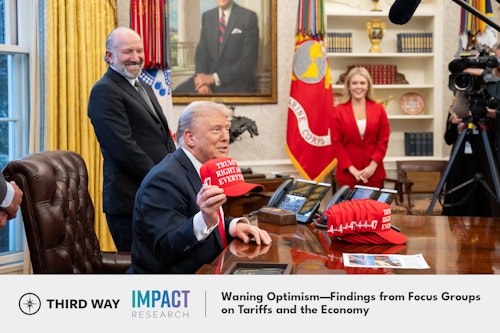Waning Optimism—Findings from Focus Groups on Tariffs and the Economy

Third Way worked with Impact Research to conduct focus groups in early March of Trump supporters who aren’t strong Republican partisans to understand their views on the economy, tariffs, and their faith in the Trump Administration’s economic plan. We also set out to gauge their patience and pain tolerance for perceived lack of results.
Read the full memo from Impact Research.
Key Takeaways—Thinning Patience
Our four focus groups were comprised mostly of Trump voters who either voted for Biden in 2020 or have voted Democratic for other offices. Nearly all our participants were willing to give President Trump the benefit of the doubt, and they held on to their optimism he COULD help. But they were broadly dissatisfied with the economy, were not confident Trump is sufficiently focused on fixing it, and were worried about how tariffs would affect the economy and their personal wellbeing.
Trump and his economic team have belittled “bedwetters” in the financial markets who have been spooked by the Administration’s economic policies. They should be worried about Main Street more than Wall Street.
Key highlights:
- Voters are aware of tariffs and did not need to be prompted. They immediately associated tariffs with higher prices that affect their daily lives, accepting this could cost them $2,000 per year.
- Among these voters, the biggest pain point on tariffs is on everyday items like groceries rather than big ticket items like cars. They are aware that a lot of things they buy come from other countries (like fruit and vegetables) and that we manufacture things that use both domestic and foreign parts.
- These Trump-friendly voters hope that tariffs are a negotiating technique to get better trade deals for America. They have faith in Trump as a negotiator and they were able to recite back the “short term pain, for long term gain” line. But they recited it with resignation, not excitement. They felt the economy was not strong and that little in the last few months stoked their optimism.
- With reconciliation approaching, there is desire for tax cuts and a willingness to cut spending, but there is pessimism that tax cuts will not help normal people like them.
- The strongest messaging against Trump’s economic agenda focused on breaking his campaign promises, driving up costs, and cutting taxes for the rich while imposing tariffs on ordinary Americans.
Subscribe
Get updates whenever new content is added. We'll never share your email with anyone.


